Information Technology's Impact on Business: M&S Case Study Report
VerifiedAdded on 2023/01/23
|18
|4168
|47
Report
AI Summary
This report delves into the integral role of Information Technology (IT) within the business landscape, emphasizing its significance in achieving organizational goals and enhancing operational efficiency. The analysis includes a comprehensive literature review, exploring the impact of IT on business functions, the application of internet and related technologies, and the System Development Life Cycle (SDLC). A detailed case study of Marks & Spencer (M&S) illustrates the practical application of IT systems, evaluating networking technologies, the use of intranet and internet, and addressing the social and ethical challenges associated with IT implementation. The report further examines the various stages of SDLC, providing a thorough understanding of the planning, system requirements, and development processes. The study concludes with a discussion of the ethical considerations crucial for the effective and responsible integration of IT within business operations.
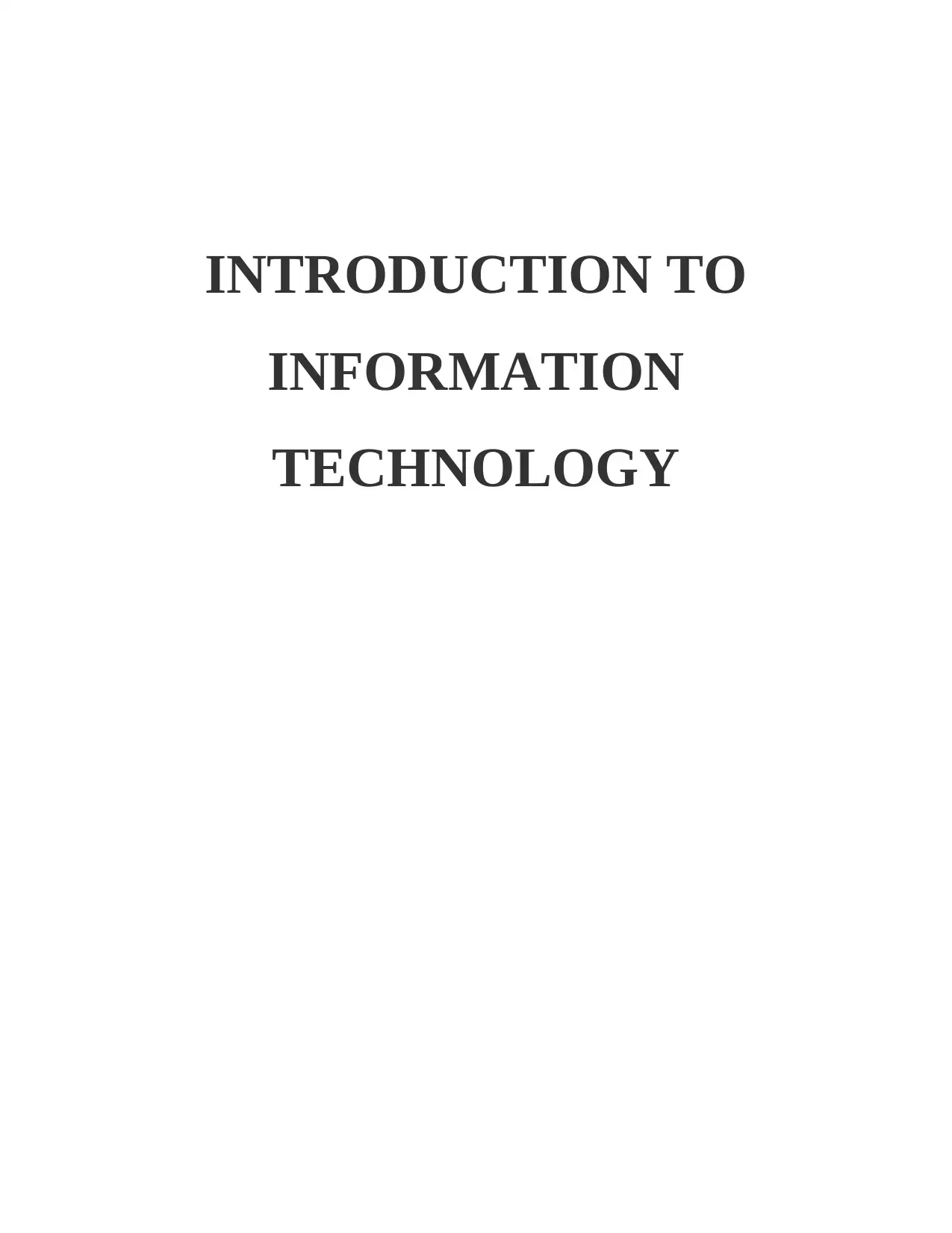
INTRODUCTION TO
INFORMATION
TECHNOLOGY
INFORMATION
TECHNOLOGY
Paraphrase This Document
Need a fresh take? Get an instant paraphrase of this document with our AI Paraphraser
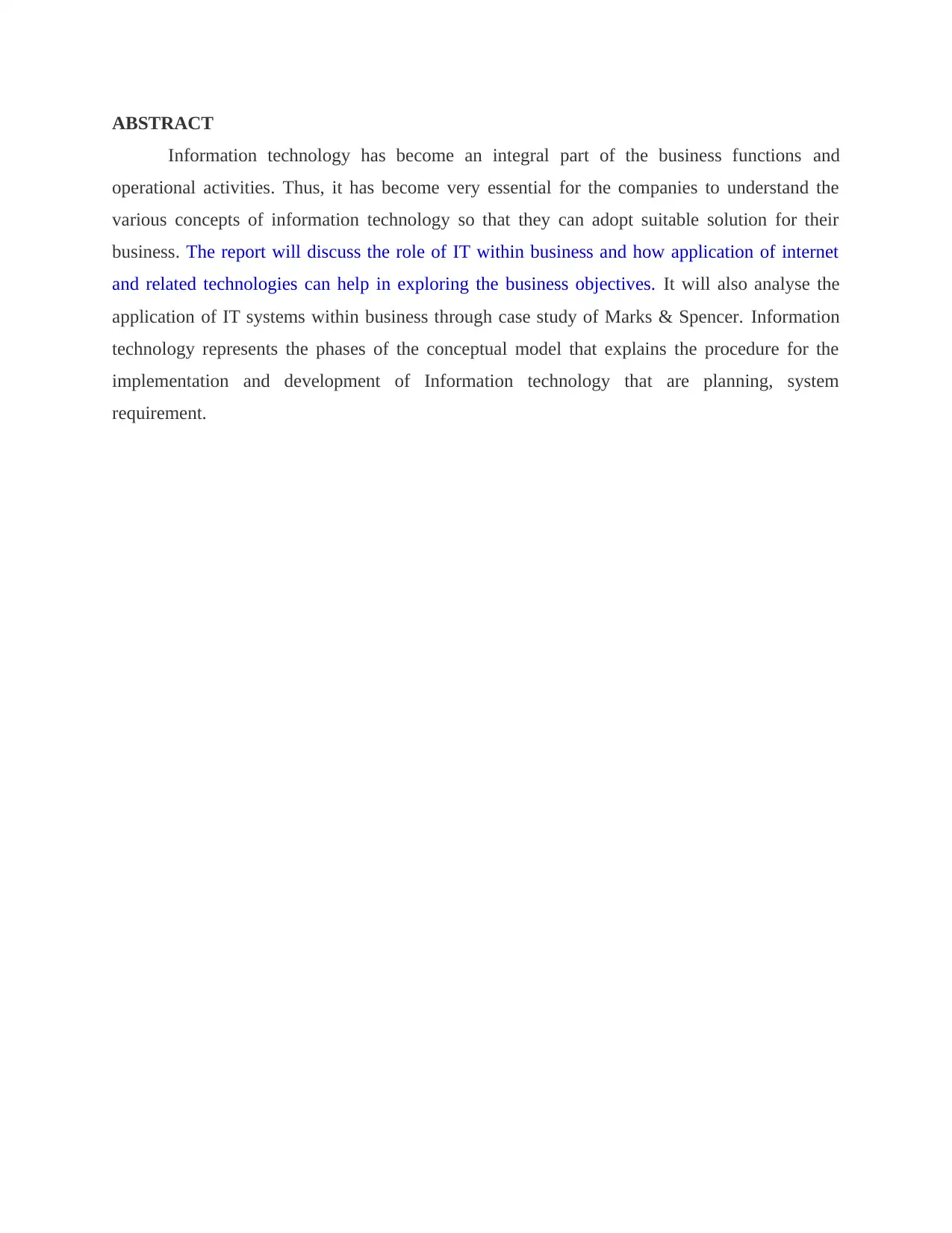
ABSTRACT
Information technology has become an integral part of the business functions and
operational activities. Thus, it has become very essential for the companies to understand the
various concepts of information technology so that they can adopt suitable solution for their
business. The report will discuss the role of IT within business and how application of internet
and related technologies can help in exploring the business objectives. It will also analyse the
application of IT systems within business through case study of Marks & Spencer. Information
technology represents the phases of the conceptual model that explains the procedure for the
implementation and development of Information technology that are planning, system
requirement.
Information technology has become an integral part of the business functions and
operational activities. Thus, it has become very essential for the companies to understand the
various concepts of information technology so that they can adopt suitable solution for their
business. The report will discuss the role of IT within business and how application of internet
and related technologies can help in exploring the business objectives. It will also analyse the
application of IT systems within business through case study of Marks & Spencer. Information
technology represents the phases of the conceptual model that explains the procedure for the
implementation and development of Information technology that are planning, system
requirement.
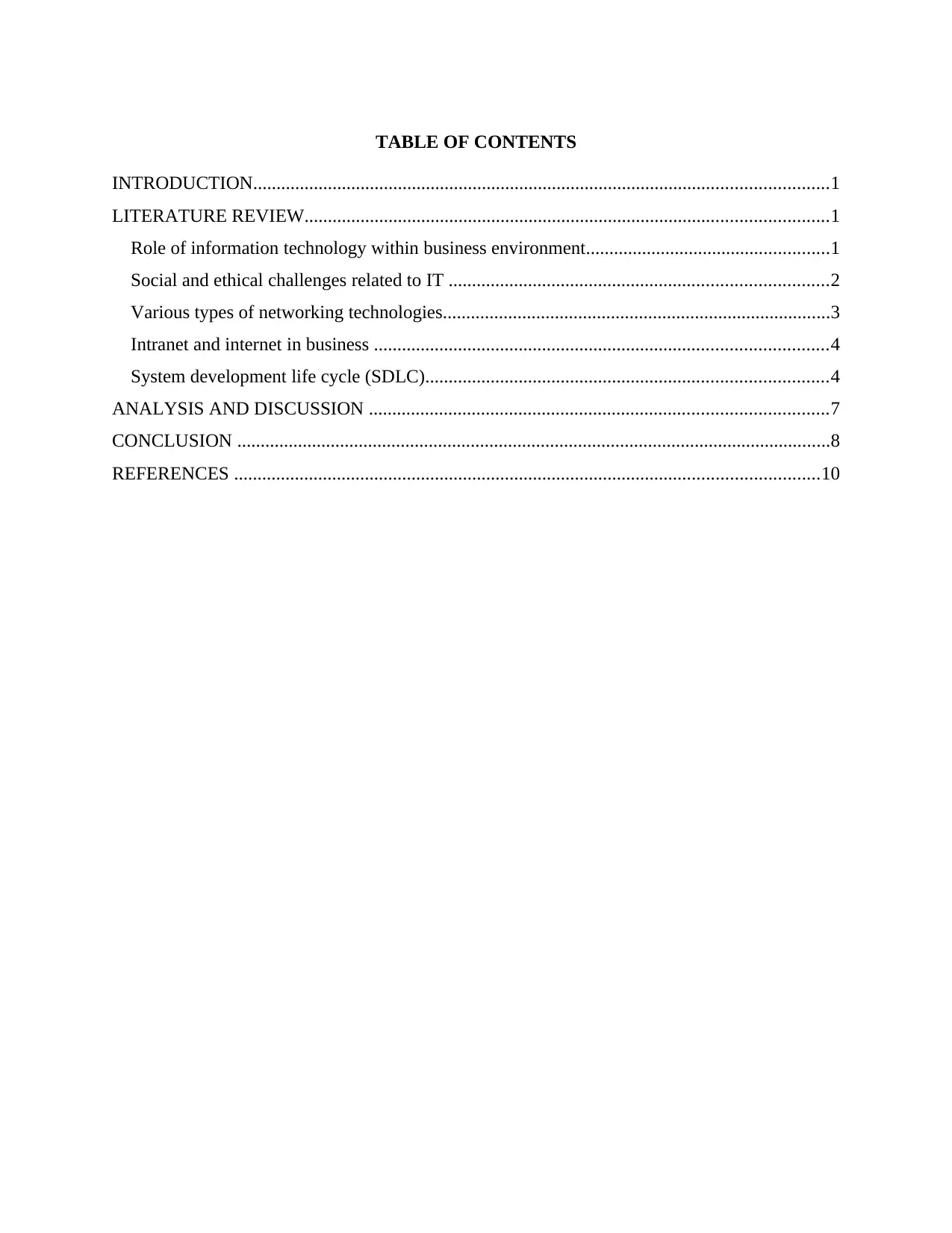
TABLE OF CONTENTS
INTRODUCTION...........................................................................................................................1
LITERATURE REVIEW................................................................................................................1
Role of information technology within business environment....................................................1
Social and ethical challenges related to IT .................................................................................2
Various types of networking technologies...................................................................................3
Intranet and internet in business .................................................................................................4
System development life cycle (SDLC)......................................................................................4
ANALYSIS AND DISCUSSION ..................................................................................................7
CONCLUSION ...............................................................................................................................8
REFERENCES .............................................................................................................................10
INTRODUCTION...........................................................................................................................1
LITERATURE REVIEW................................................................................................................1
Role of information technology within business environment....................................................1
Social and ethical challenges related to IT .................................................................................2
Various types of networking technologies...................................................................................3
Intranet and internet in business .................................................................................................4
System development life cycle (SDLC)......................................................................................4
ANALYSIS AND DISCUSSION ..................................................................................................7
CONCLUSION ...............................................................................................................................8
REFERENCES .............................................................................................................................10
⊘ This is a preview!⊘
Do you want full access?
Subscribe today to unlock all pages.

Trusted by 1+ million students worldwide
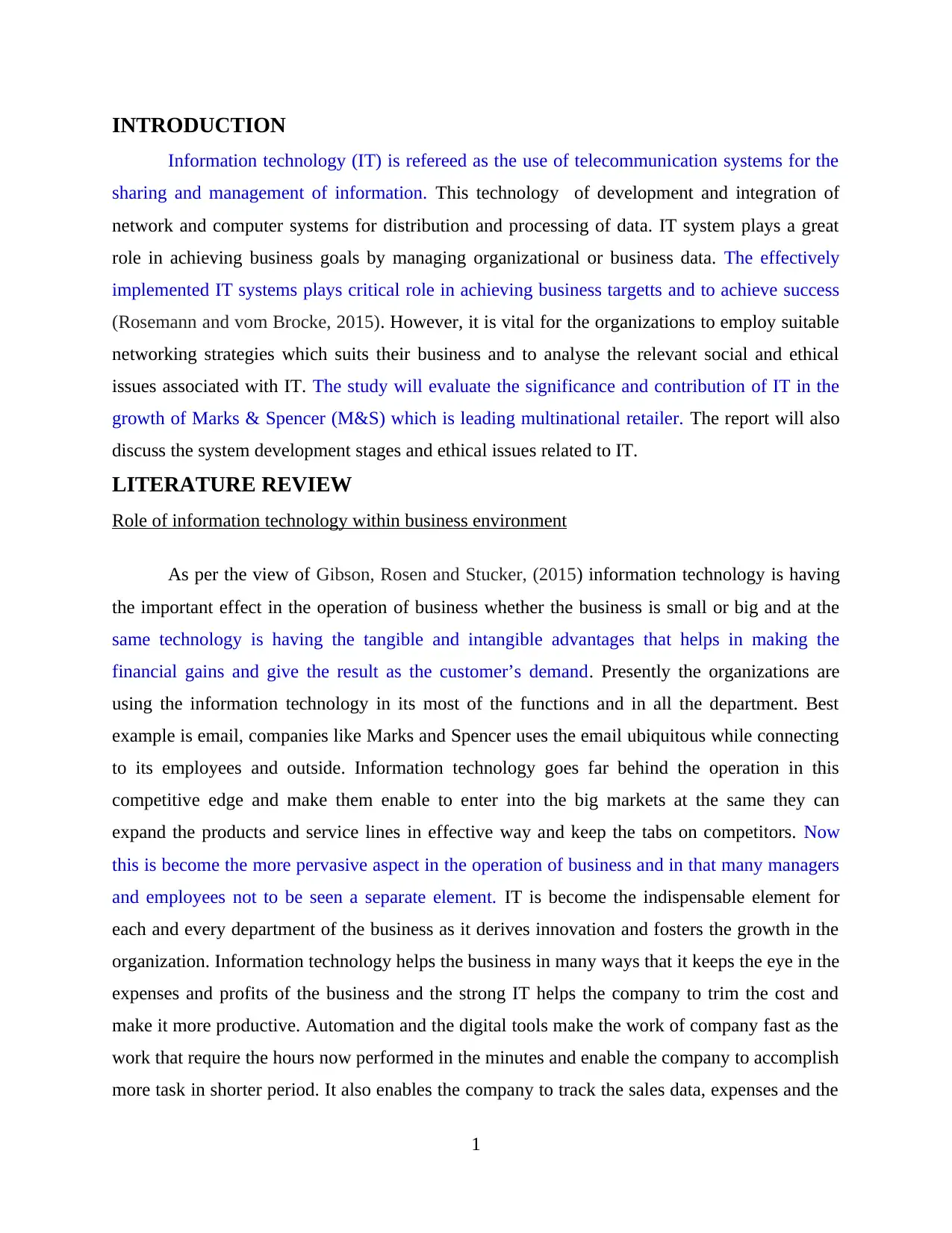
INTRODUCTION
Information technology (IT) is refereed as the use of telecommunication systems for the
sharing and management of information. This technology of development and integration of
network and computer systems for distribution and processing of data. IT system plays a great
role in achieving business goals by managing organizational or business data. The effectively
implemented IT systems plays critical role in achieving business targetts and to achieve success
(Rosemann and vom Brocke, 2015). However, it is vital for the organizations to employ suitable
networking strategies which suits their business and to analyse the relevant social and ethical
issues associated with IT. The study will evaluate the significance and contribution of IT in the
growth of Marks & Spencer (M&S) which is leading multinational retailer. The report will also
discuss the system development stages and ethical issues related to IT.
LITERATURE REVIEW
Role of information technology within business environment
As per the view of Gibson, Rosen and Stucker, (2015) information technology is having
the important effect in the operation of business whether the business is small or big and at the
same technology is having the tangible and intangible advantages that helps in making the
financial gains and give the result as the customer’s demand. Presently the organizations are
using the information technology in its most of the functions and in all the department. Best
example is email, companies like Marks and Spencer uses the email ubiquitous while connecting
to its employees and outside. Information technology goes far behind the operation in this
competitive edge and make them enable to enter into the big markets at the same they can
expand the products and service lines in effective way and keep the tabs on competitors. Now
this is become the more pervasive aspect in the operation of business and in that many managers
and employees not to be seen a separate element. IT is become the indispensable element for
each and every department of the business as it derives innovation and fosters the growth in the
organization. Information technology helps the business in many ways that it keeps the eye in the
expenses and profits of the business and the strong IT helps the company to trim the cost and
make it more productive. Automation and the digital tools make the work of company fast as the
work that require the hours now performed in the minutes and enable the company to accomplish
more task in shorter period. It also enables the company to track the sales data, expenses and the
1
Information technology (IT) is refereed as the use of telecommunication systems for the
sharing and management of information. This technology of development and integration of
network and computer systems for distribution and processing of data. IT system plays a great
role in achieving business goals by managing organizational or business data. The effectively
implemented IT systems plays critical role in achieving business targetts and to achieve success
(Rosemann and vom Brocke, 2015). However, it is vital for the organizations to employ suitable
networking strategies which suits their business and to analyse the relevant social and ethical
issues associated with IT. The study will evaluate the significance and contribution of IT in the
growth of Marks & Spencer (M&S) which is leading multinational retailer. The report will also
discuss the system development stages and ethical issues related to IT.
LITERATURE REVIEW
Role of information technology within business environment
As per the view of Gibson, Rosen and Stucker, (2015) information technology is having
the important effect in the operation of business whether the business is small or big and at the
same technology is having the tangible and intangible advantages that helps in making the
financial gains and give the result as the customer’s demand. Presently the organizations are
using the information technology in its most of the functions and in all the department. Best
example is email, companies like Marks and Spencer uses the email ubiquitous while connecting
to its employees and outside. Information technology goes far behind the operation in this
competitive edge and make them enable to enter into the big markets at the same they can
expand the products and service lines in effective way and keep the tabs on competitors. Now
this is become the more pervasive aspect in the operation of business and in that many managers
and employees not to be seen a separate element. IT is become the indispensable element for
each and every department of the business as it derives innovation and fosters the growth in the
organization. Information technology helps the business in many ways that it keeps the eye in the
expenses and profits of the business and the strong IT helps the company to trim the cost and
make it more productive. Automation and the digital tools make the work of company fast as the
work that require the hours now performed in the minutes and enable the company to accomplish
more task in shorter period. It also enables the company to track the sales data, expenses and the
1
Paraphrase This Document
Need a fresh take? Get an instant paraphrase of this document with our AI Paraphraser
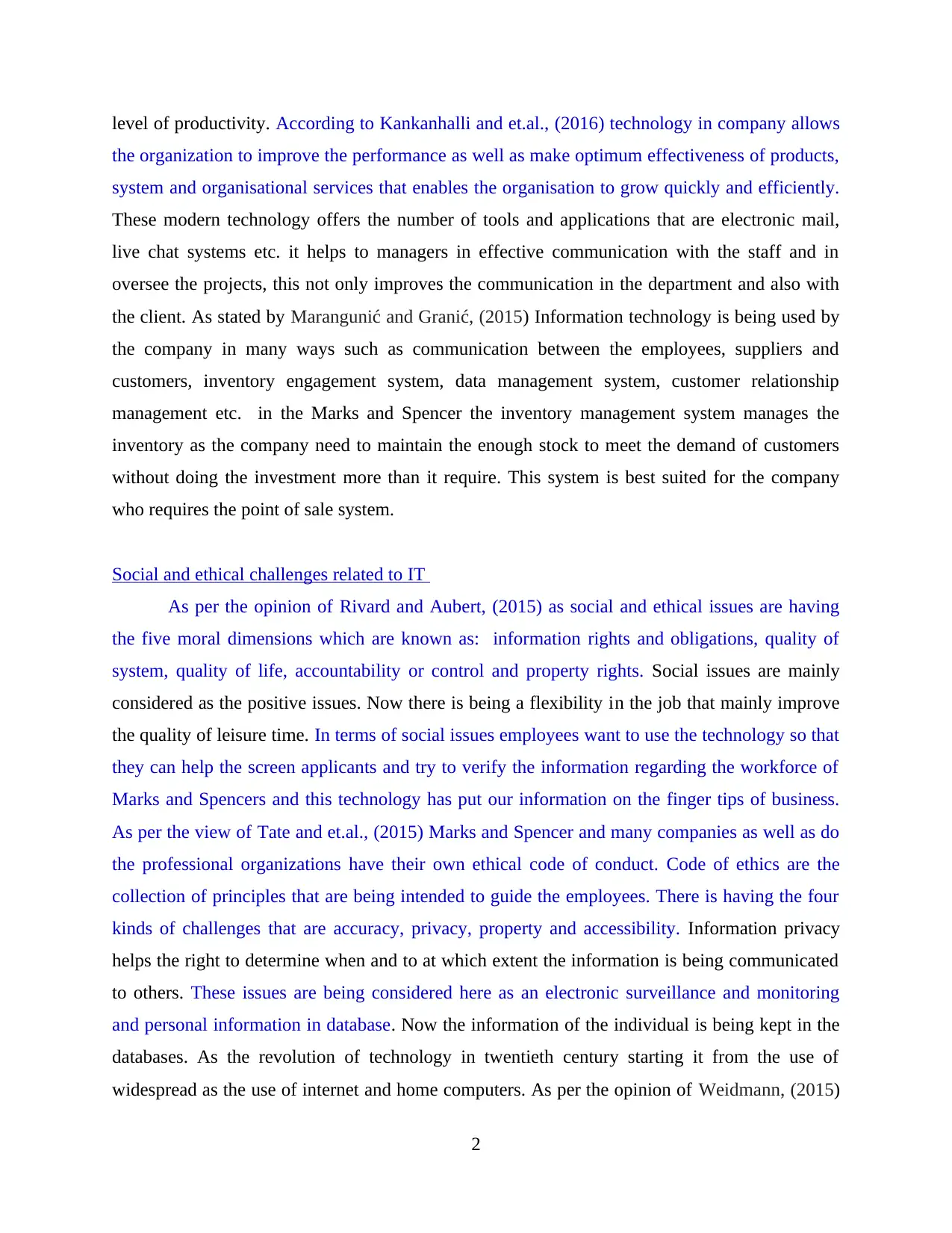
level of productivity. According to Kankanhalli and et.al., (2016) technology in company allows
the organization to improve the performance as well as make optimum effectiveness of products,
system and organisational services that enables the organisation to grow quickly and efficiently.
These modern technology offers the number of tools and applications that are electronic mail,
live chat systems etc. it helps to managers in effective communication with the staff and in
oversee the projects, this not only improves the communication in the department and also with
the client. As stated by Marangunić and Granić, (2015) Information technology is being used by
the company in many ways such as communication between the employees, suppliers and
customers, inventory engagement system, data management system, customer relationship
management etc. in the Marks and Spencer the inventory management system manages the
inventory as the company need to maintain the enough stock to meet the demand of customers
without doing the investment more than it require. This system is best suited for the company
who requires the point of sale system.
Social and ethical challenges related to IT
As per the opinion of Rivard and Aubert, (2015) as social and ethical issues are having
the five moral dimensions which are known as: information rights and obligations, quality of
system, quality of life, accountability or control and property rights. Social issues are mainly
considered as the positive issues. Now there is being a flexibility in the job that mainly improve
the quality of leisure time. In terms of social issues employees want to use the technology so that
they can help the screen applicants and try to verify the information regarding the workforce of
Marks and Spencers and this technology has put our information on the finger tips of business.
As per the view of Tate and et.al., (2015) Marks and Spencer and many companies as well as do
the professional organizations have their own ethical code of conduct. Code of ethics are the
collection of principles that are being intended to guide the employees. There is having the four
kinds of challenges that are accuracy, privacy, property and accessibility. Information privacy
helps the right to determine when and to at which extent the information is being communicated
to others. These issues are being considered here as an electronic surveillance and monitoring
and personal information in database. Now the information of the individual is being kept in the
databases. As the revolution of technology in twentieth century starting it from the use of
widespread as the use of internet and home computers. As per the opinion of Weidmann, (2015)
2
the organization to improve the performance as well as make optimum effectiveness of products,
system and organisational services that enables the organisation to grow quickly and efficiently.
These modern technology offers the number of tools and applications that are electronic mail,
live chat systems etc. it helps to managers in effective communication with the staff and in
oversee the projects, this not only improves the communication in the department and also with
the client. As stated by Marangunić and Granić, (2015) Information technology is being used by
the company in many ways such as communication between the employees, suppliers and
customers, inventory engagement system, data management system, customer relationship
management etc. in the Marks and Spencer the inventory management system manages the
inventory as the company need to maintain the enough stock to meet the demand of customers
without doing the investment more than it require. This system is best suited for the company
who requires the point of sale system.
Social and ethical challenges related to IT
As per the opinion of Rivard and Aubert, (2015) as social and ethical issues are having
the five moral dimensions which are known as: information rights and obligations, quality of
system, quality of life, accountability or control and property rights. Social issues are mainly
considered as the positive issues. Now there is being a flexibility in the job that mainly improve
the quality of leisure time. In terms of social issues employees want to use the technology so that
they can help the screen applicants and try to verify the information regarding the workforce of
Marks and Spencers and this technology has put our information on the finger tips of business.
As per the view of Tate and et.al., (2015) Marks and Spencer and many companies as well as do
the professional organizations have their own ethical code of conduct. Code of ethics are the
collection of principles that are being intended to guide the employees. There is having the four
kinds of challenges that are accuracy, privacy, property and accessibility. Information privacy
helps the right to determine when and to at which extent the information is being communicated
to others. These issues are being considered here as an electronic surveillance and monitoring
and personal information in database. Now the information of the individual is being kept in the
databases. As the revolution of technology in twentieth century starting it from the use of
widespread as the use of internet and home computers. As per the opinion of Weidmann, (2015)
2
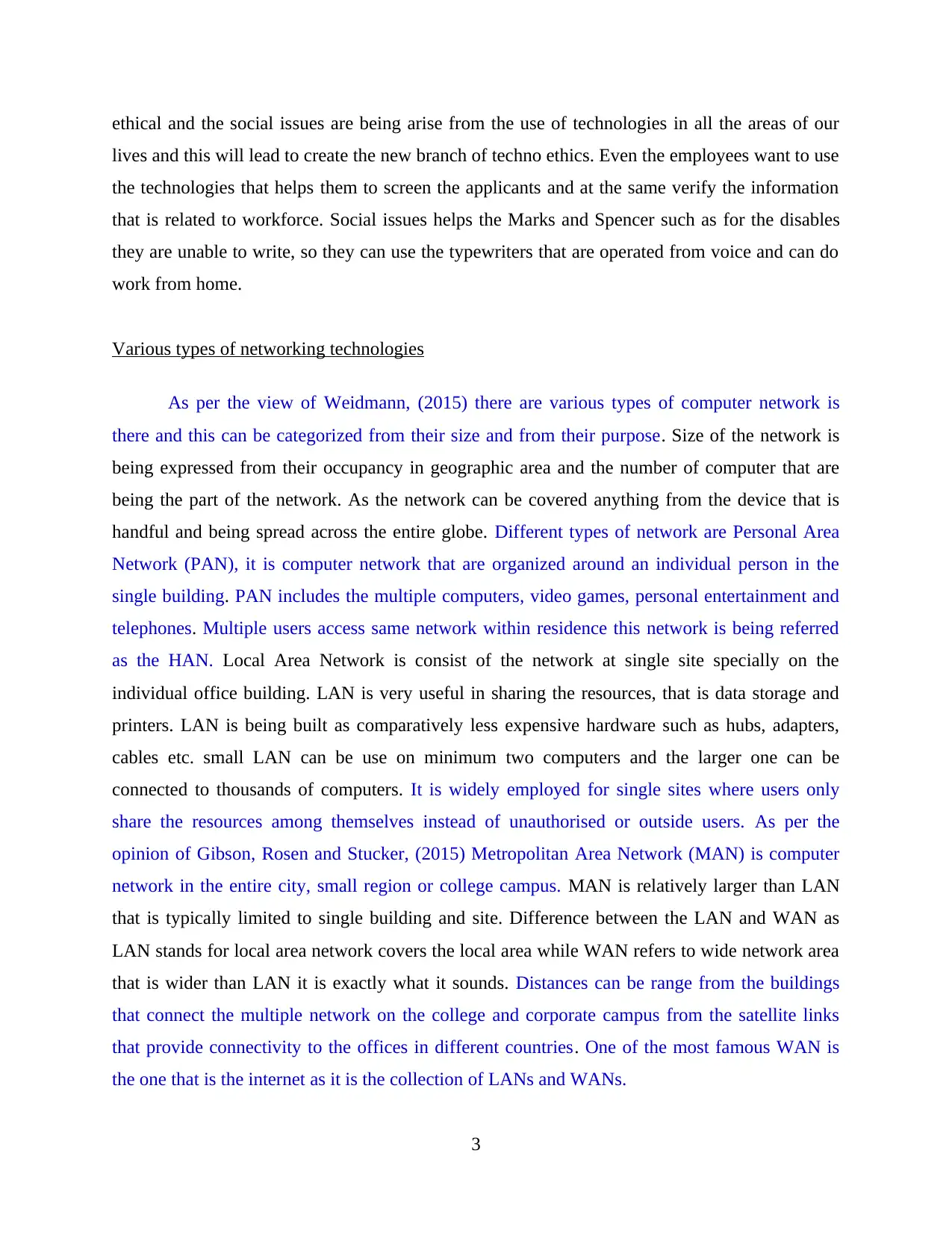
ethical and the social issues are being arise from the use of technologies in all the areas of our
lives and this will lead to create the new branch of techno ethics. Even the employees want to use
the technologies that helps them to screen the applicants and at the same verify the information
that is related to workforce. Social issues helps the Marks and Spencer such as for the disables
they are unable to write, so they can use the typewriters that are operated from voice and can do
work from home.
Various types of networking technologies
As per the view of Weidmann, (2015) there are various types of computer network is
there and this can be categorized from their size and from their purpose. Size of the network is
being expressed from their occupancy in geographic area and the number of computer that are
being the part of the network. As the network can be covered anything from the device that is
handful and being spread across the entire globe. Different types of network are Personal Area
Network (PAN), it is computer network that are organized around an individual person in the
single building. PAN includes the multiple computers, video games, personal entertainment and
telephones. Multiple users access same network within residence this network is being referred
as the HAN. Local Area Network is consist of the network at single site specially on the
individual office building. LAN is very useful in sharing the resources, that is data storage and
printers. LAN is being built as comparatively less expensive hardware such as hubs, adapters,
cables etc. small LAN can be use on minimum two computers and the larger one can be
connected to thousands of computers. It is widely employed for single sites where users only
share the resources among themselves instead of unauthorised or outside users. As per the
opinion of Gibson, Rosen and Stucker, (2015) Metropolitan Area Network (MAN) is computer
network in the entire city, small region or college campus. MAN is relatively larger than LAN
that is typically limited to single building and site. Difference between the LAN and WAN as
LAN stands for local area network covers the local area while WAN refers to wide network area
that is wider than LAN it is exactly what it sounds. Distances can be range from the buildings
that connect the multiple network on the college and corporate campus from the satellite links
that provide connectivity to the offices in different countries. One of the most famous WAN is
the one that is the internet as it is the collection of LANs and WANs.
3
lives and this will lead to create the new branch of techno ethics. Even the employees want to use
the technologies that helps them to screen the applicants and at the same verify the information
that is related to workforce. Social issues helps the Marks and Spencer such as for the disables
they are unable to write, so they can use the typewriters that are operated from voice and can do
work from home.
Various types of networking technologies
As per the view of Weidmann, (2015) there are various types of computer network is
there and this can be categorized from their size and from their purpose. Size of the network is
being expressed from their occupancy in geographic area and the number of computer that are
being the part of the network. As the network can be covered anything from the device that is
handful and being spread across the entire globe. Different types of network are Personal Area
Network (PAN), it is computer network that are organized around an individual person in the
single building. PAN includes the multiple computers, video games, personal entertainment and
telephones. Multiple users access same network within residence this network is being referred
as the HAN. Local Area Network is consist of the network at single site specially on the
individual office building. LAN is very useful in sharing the resources, that is data storage and
printers. LAN is being built as comparatively less expensive hardware such as hubs, adapters,
cables etc. small LAN can be use on minimum two computers and the larger one can be
connected to thousands of computers. It is widely employed for single sites where users only
share the resources among themselves instead of unauthorised or outside users. As per the
opinion of Gibson, Rosen and Stucker, (2015) Metropolitan Area Network (MAN) is computer
network in the entire city, small region or college campus. MAN is relatively larger than LAN
that is typically limited to single building and site. Difference between the LAN and WAN as
LAN stands for local area network covers the local area while WAN refers to wide network area
that is wider than LAN it is exactly what it sounds. Distances can be range from the buildings
that connect the multiple network on the college and corporate campus from the satellite links
that provide connectivity to the offices in different countries. One of the most famous WAN is
the one that is the internet as it is the collection of LANs and WANs.
3
⊘ This is a preview!⊘
Do you want full access?
Subscribe today to unlock all pages.

Trusted by 1+ million students worldwide
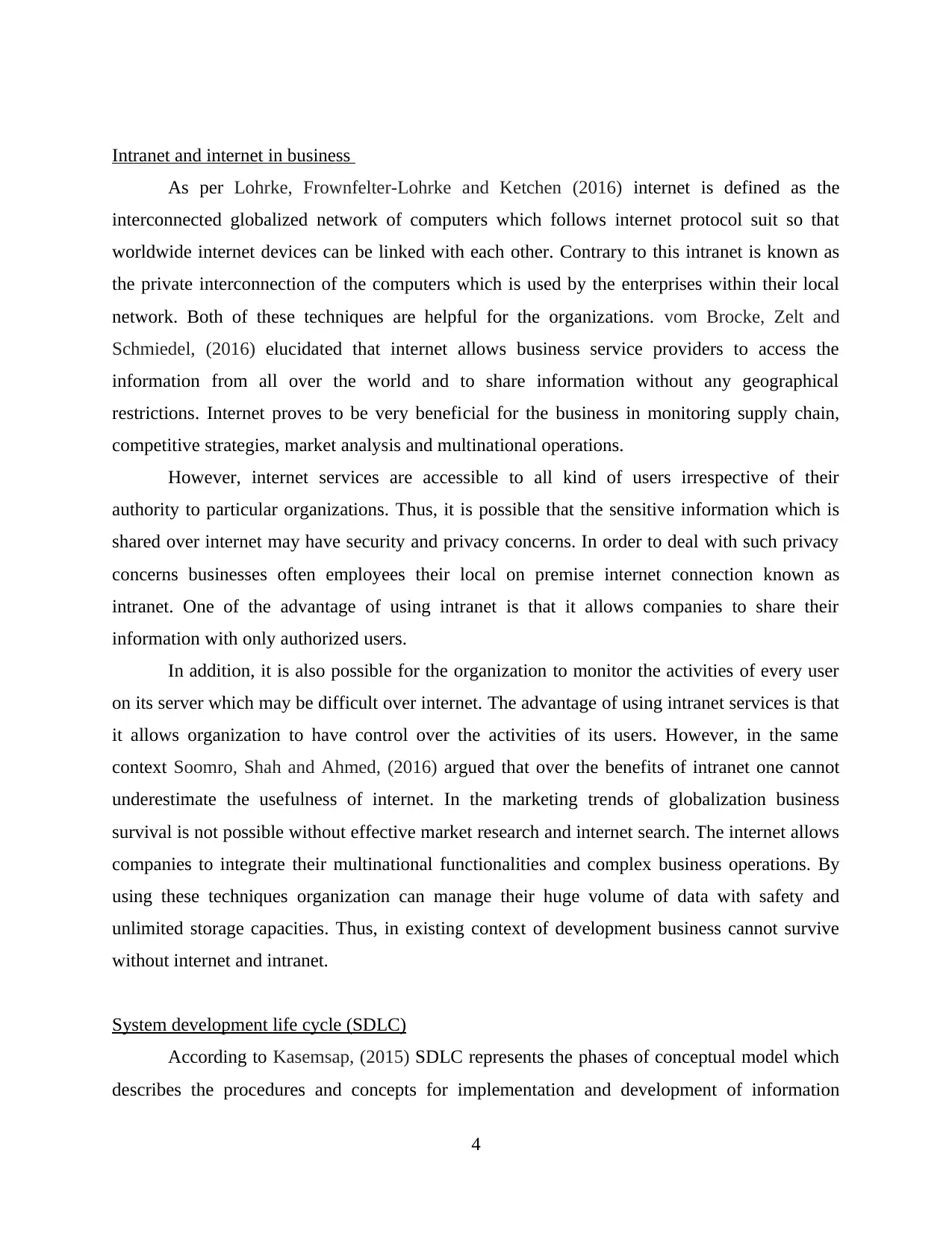
Intranet and internet in business
As per Lohrke, Frownfelter-Lohrke and Ketchen (2016) internet is defined as the
interconnected globalized network of computers which follows internet protocol suit so that
worldwide internet devices can be linked with each other. Contrary to this intranet is known as
the private interconnection of the computers which is used by the enterprises within their local
network. Both of these techniques are helpful for the organizations. vom Brocke, Zelt and
Schmiedel, (2016) elucidated that internet allows business service providers to access the
information from all over the world and to share information without any geographical
restrictions. Internet proves to be very beneficial for the business in monitoring supply chain,
competitive strategies, market analysis and multinational operations.
However, internet services are accessible to all kind of users irrespective of their
authority to particular organizations. Thus, it is possible that the sensitive information which is
shared over internet may have security and privacy concerns. In order to deal with such privacy
concerns businesses often employees their local on premise internet connection known as
intranet. One of the advantage of using intranet is that it allows companies to share their
information with only authorized users.
In addition, it is also possible for the organization to monitor the activities of every user
on its server which may be difficult over internet. The advantage of using intranet services is that
it allows organization to have control over the activities of its users. However, in the same
context Soomro, Shah and Ahmed, (2016) argued that over the benefits of intranet one cannot
underestimate the usefulness of internet. In the marketing trends of globalization business
survival is not possible without effective market research and internet search. The internet allows
companies to integrate their multinational functionalities and complex business operations. By
using these techniques organization can manage their huge volume of data with safety and
unlimited storage capacities. Thus, in existing context of development business cannot survive
without internet and intranet.
System development life cycle (SDLC)
According to Kasemsap, (2015) SDLC represents the phases of conceptual model which
describes the procedures and concepts for implementation and development of information
4
As per Lohrke, Frownfelter-Lohrke and Ketchen (2016) internet is defined as the
interconnected globalized network of computers which follows internet protocol suit so that
worldwide internet devices can be linked with each other. Contrary to this intranet is known as
the private interconnection of the computers which is used by the enterprises within their local
network. Both of these techniques are helpful for the organizations. vom Brocke, Zelt and
Schmiedel, (2016) elucidated that internet allows business service providers to access the
information from all over the world and to share information without any geographical
restrictions. Internet proves to be very beneficial for the business in monitoring supply chain,
competitive strategies, market analysis and multinational operations.
However, internet services are accessible to all kind of users irrespective of their
authority to particular organizations. Thus, it is possible that the sensitive information which is
shared over internet may have security and privacy concerns. In order to deal with such privacy
concerns businesses often employees their local on premise internet connection known as
intranet. One of the advantage of using intranet is that it allows companies to share their
information with only authorized users.
In addition, it is also possible for the organization to monitor the activities of every user
on its server which may be difficult over internet. The advantage of using intranet services is that
it allows organization to have control over the activities of its users. However, in the same
context Soomro, Shah and Ahmed, (2016) argued that over the benefits of intranet one cannot
underestimate the usefulness of internet. In the marketing trends of globalization business
survival is not possible without effective market research and internet search. The internet allows
companies to integrate their multinational functionalities and complex business operations. By
using these techniques organization can manage their huge volume of data with safety and
unlimited storage capacities. Thus, in existing context of development business cannot survive
without internet and intranet.
System development life cycle (SDLC)
According to Kasemsap, (2015) SDLC represents the phases of conceptual model which
describes the procedures and concepts for implementation and development of information
4
Paraphrase This Document
Need a fresh take? Get an instant paraphrase of this document with our AI Paraphraser
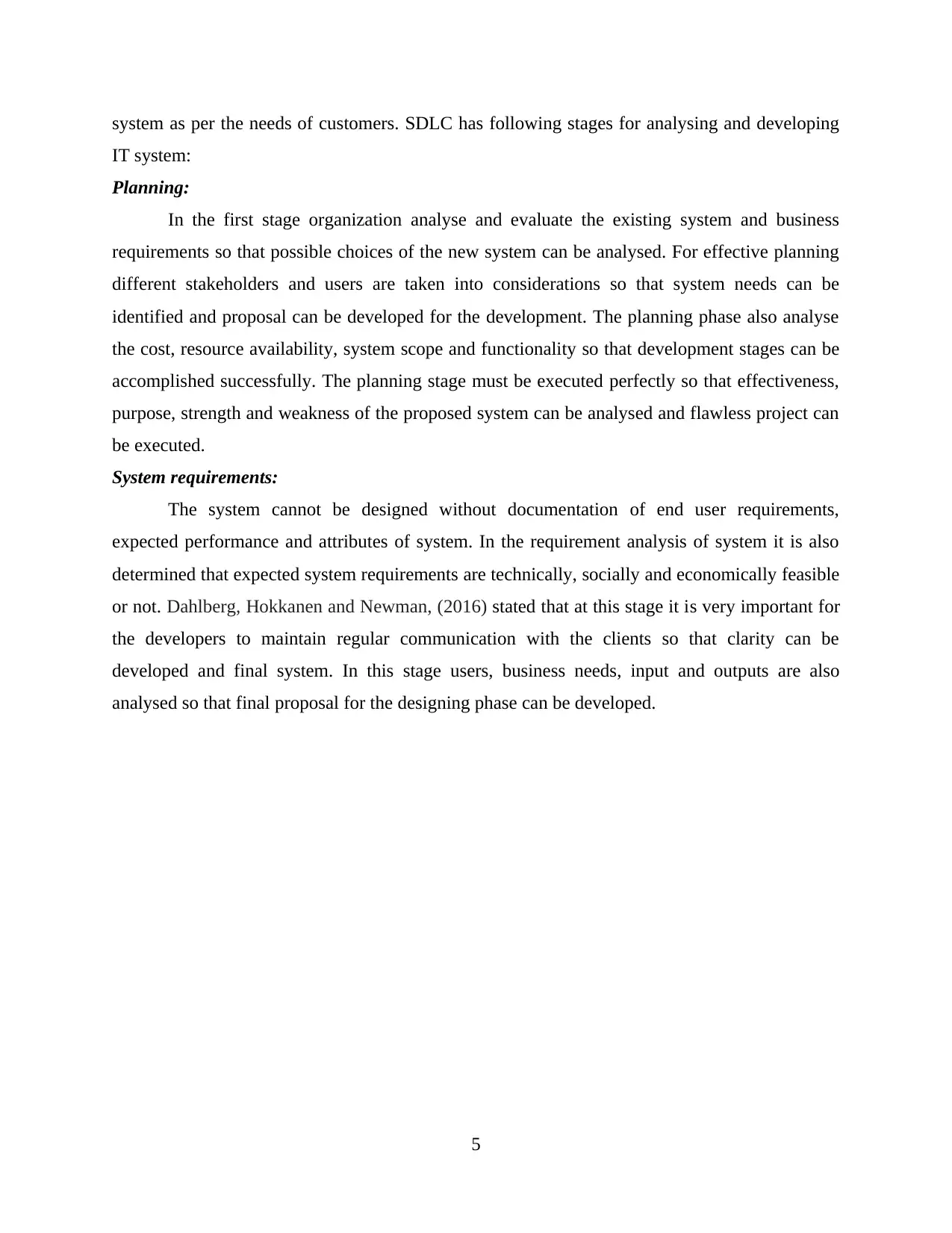
system as per the needs of customers. SDLC has following stages for analysing and developing
IT system:
Planning:
In the first stage organization analyse and evaluate the existing system and business
requirements so that possible choices of the new system can be analysed. For effective planning
different stakeholders and users are taken into considerations so that system needs can be
identified and proposal can be developed for the development. The planning phase also analyse
the cost, resource availability, system scope and functionality so that development stages can be
accomplished successfully. The planning stage must be executed perfectly so that effectiveness,
purpose, strength and weakness of the proposed system can be analysed and flawless project can
be executed.
System requirements:
The system cannot be designed without documentation of end user requirements,
expected performance and attributes of system. In the requirement analysis of system it is also
determined that expected system requirements are technically, socially and economically feasible
or not. Dahlberg, Hokkanen and Newman, (2016) stated that at this stage it is very important for
the developers to maintain regular communication with the clients so that clarity can be
developed and final system. In this stage users, business needs, input and outputs are also
analysed so that final proposal for the designing phase can be developed.
5
IT system:
Planning:
In the first stage organization analyse and evaluate the existing system and business
requirements so that possible choices of the new system can be analysed. For effective planning
different stakeholders and users are taken into considerations so that system needs can be
identified and proposal can be developed for the development. The planning phase also analyse
the cost, resource availability, system scope and functionality so that development stages can be
accomplished successfully. The planning stage must be executed perfectly so that effectiveness,
purpose, strength and weakness of the proposed system can be analysed and flawless project can
be executed.
System requirements:
The system cannot be designed without documentation of end user requirements,
expected performance and attributes of system. In the requirement analysis of system it is also
determined that expected system requirements are technically, socially and economically feasible
or not. Dahlberg, Hokkanen and Newman, (2016) stated that at this stage it is very important for
the developers to maintain regular communication with the clients so that clarity can be
developed and final system. In this stage users, business needs, input and outputs are also
analysed so that final proposal for the designing phase can be developed.
5
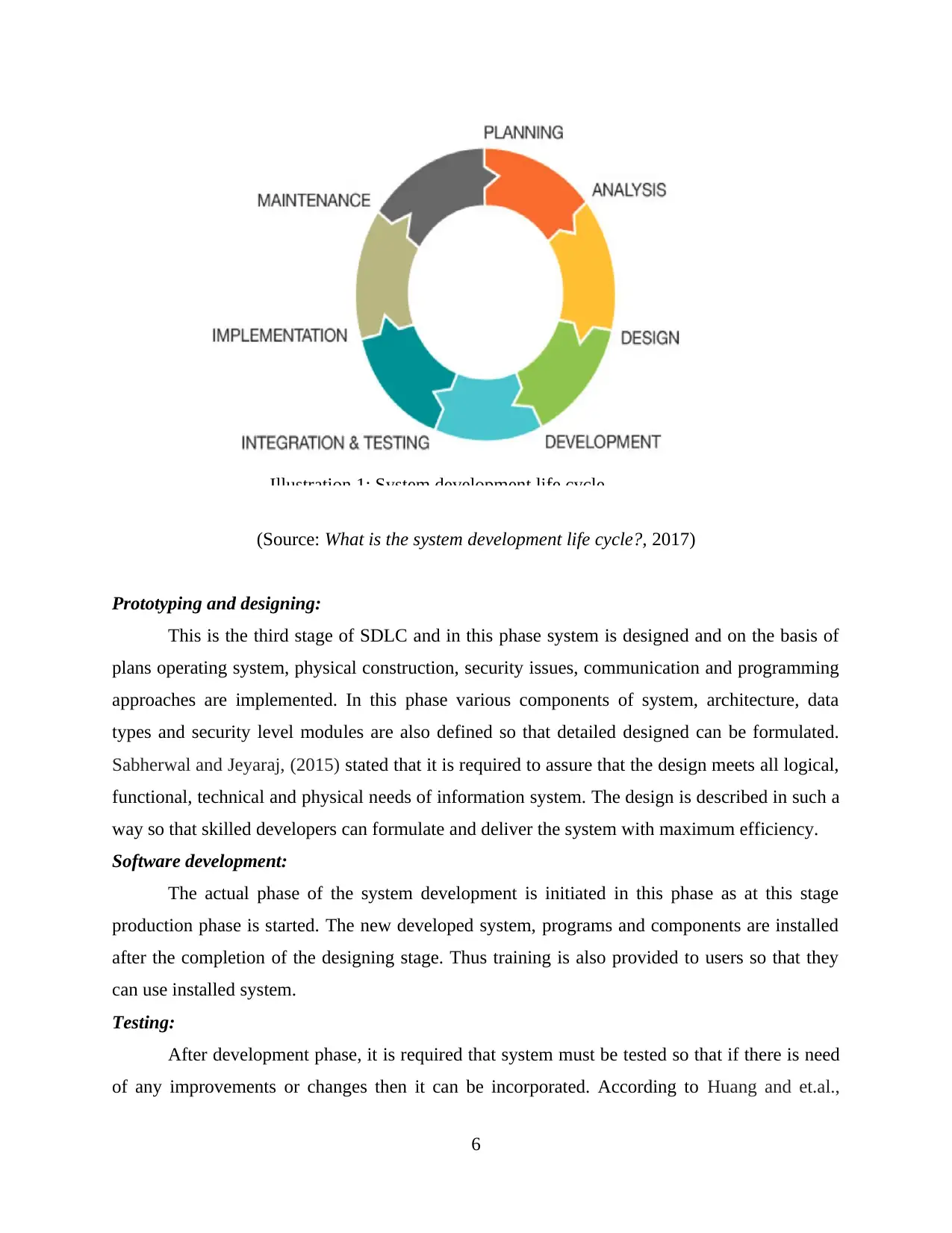
(Source: What is the system development life cycle?, 2017)
Prototyping and designing:
This is the third stage of SDLC and in this phase system is designed and on the basis of
plans operating system, physical construction, security issues, communication and programming
approaches are implemented. In this phase various components of system, architecture, data
types and security level modules are also defined so that detailed designed can be formulated.
Sabherwal and Jeyaraj, (2015) stated that it is required to assure that the design meets all logical,
functional, technical and physical needs of information system. The design is described in such a
way so that skilled developers can formulate and deliver the system with maximum efficiency.
Software development:
The actual phase of the system development is initiated in this phase as at this stage
production phase is started. The new developed system, programs and components are installed
after the completion of the designing stage. Thus training is also provided to users so that they
can use installed system.
Testing:
After development phase, it is required that system must be tested so that if there is need
of any improvements or changes then it can be incorporated. According to Huang and et.al.,
6
Illustration 1: System development life cycle
Prototyping and designing:
This is the third stage of SDLC and in this phase system is designed and on the basis of
plans operating system, physical construction, security issues, communication and programming
approaches are implemented. In this phase various components of system, architecture, data
types and security level modules are also defined so that detailed designed can be formulated.
Sabherwal and Jeyaraj, (2015) stated that it is required to assure that the design meets all logical,
functional, technical and physical needs of information system. The design is described in such a
way so that skilled developers can formulate and deliver the system with maximum efficiency.
Software development:
The actual phase of the system development is initiated in this phase as at this stage
production phase is started. The new developed system, programs and components are installed
after the completion of the designing stage. Thus training is also provided to users so that they
can use installed system.
Testing:
After development phase, it is required that system must be tested so that if there is need
of any improvements or changes then it can be incorporated. According to Huang and et.al.,
6
Illustration 1: System development life cycle
⊘ This is a preview!⊘
Do you want full access?
Subscribe today to unlock all pages.

Trusted by 1+ million students worldwide
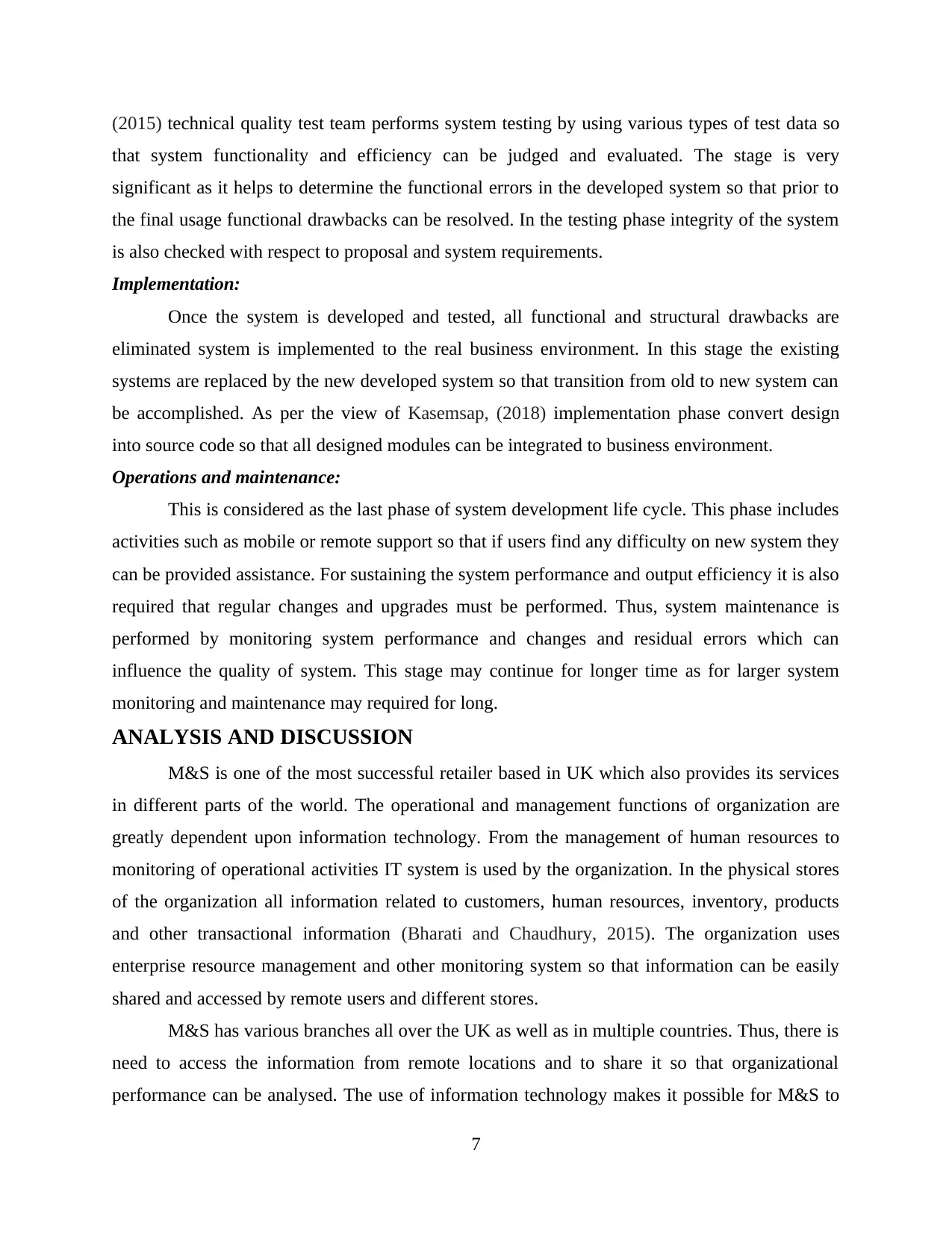
(2015) technical quality test team performs system testing by using various types of test data so
that system functionality and efficiency can be judged and evaluated. The stage is very
significant as it helps to determine the functional errors in the developed system so that prior to
the final usage functional drawbacks can be resolved. In the testing phase integrity of the system
is also checked with respect to proposal and system requirements.
Implementation:
Once the system is developed and tested, all functional and structural drawbacks are
eliminated system is implemented to the real business environment. In this stage the existing
systems are replaced by the new developed system so that transition from old to new system can
be accomplished. As per the view of Kasemsap, (2018) implementation phase convert design
into source code so that all designed modules can be integrated to business environment.
Operations and maintenance:
This is considered as the last phase of system development life cycle. This phase includes
activities such as mobile or remote support so that if users find any difficulty on new system they
can be provided assistance. For sustaining the system performance and output efficiency it is also
required that regular changes and upgrades must be performed. Thus, system maintenance is
performed by monitoring system performance and changes and residual errors which can
influence the quality of system. This stage may continue for longer time as for larger system
monitoring and maintenance may required for long.
ANALYSIS AND DISCUSSION
M&S is one of the most successful retailer based in UK which also provides its services
in different parts of the world. The operational and management functions of organization are
greatly dependent upon information technology. From the management of human resources to
monitoring of operational activities IT system is used by the organization. In the physical stores
of the organization all information related to customers, human resources, inventory, products
and other transactional information (Bharati and Chaudhury, 2015). The organization uses
enterprise resource management and other monitoring system so that information can be easily
shared and accessed by remote users and different stores.
M&S has various branches all over the UK as well as in multiple countries. Thus, there is
need to access the information from remote locations and to share it so that organizational
performance can be analysed. The use of information technology makes it possible for M&S to
7
that system functionality and efficiency can be judged and evaluated. The stage is very
significant as it helps to determine the functional errors in the developed system so that prior to
the final usage functional drawbacks can be resolved. In the testing phase integrity of the system
is also checked with respect to proposal and system requirements.
Implementation:
Once the system is developed and tested, all functional and structural drawbacks are
eliminated system is implemented to the real business environment. In this stage the existing
systems are replaced by the new developed system so that transition from old to new system can
be accomplished. As per the view of Kasemsap, (2018) implementation phase convert design
into source code so that all designed modules can be integrated to business environment.
Operations and maintenance:
This is considered as the last phase of system development life cycle. This phase includes
activities such as mobile or remote support so that if users find any difficulty on new system they
can be provided assistance. For sustaining the system performance and output efficiency it is also
required that regular changes and upgrades must be performed. Thus, system maintenance is
performed by monitoring system performance and changes and residual errors which can
influence the quality of system. This stage may continue for longer time as for larger system
monitoring and maintenance may required for long.
ANALYSIS AND DISCUSSION
M&S is one of the most successful retailer based in UK which also provides its services
in different parts of the world. The operational and management functions of organization are
greatly dependent upon information technology. From the management of human resources to
monitoring of operational activities IT system is used by the organization. In the physical stores
of the organization all information related to customers, human resources, inventory, products
and other transactional information (Bharati and Chaudhury, 2015). The organization uses
enterprise resource management and other monitoring system so that information can be easily
shared and accessed by remote users and different stores.
M&S has various branches all over the UK as well as in multiple countries. Thus, there is
need to access the information from remote locations and to share it so that organizational
performance can be analysed. The use of information technology makes it possible for M&S to
7
Paraphrase This Document
Need a fresh take? Get an instant paraphrase of this document with our AI Paraphraser
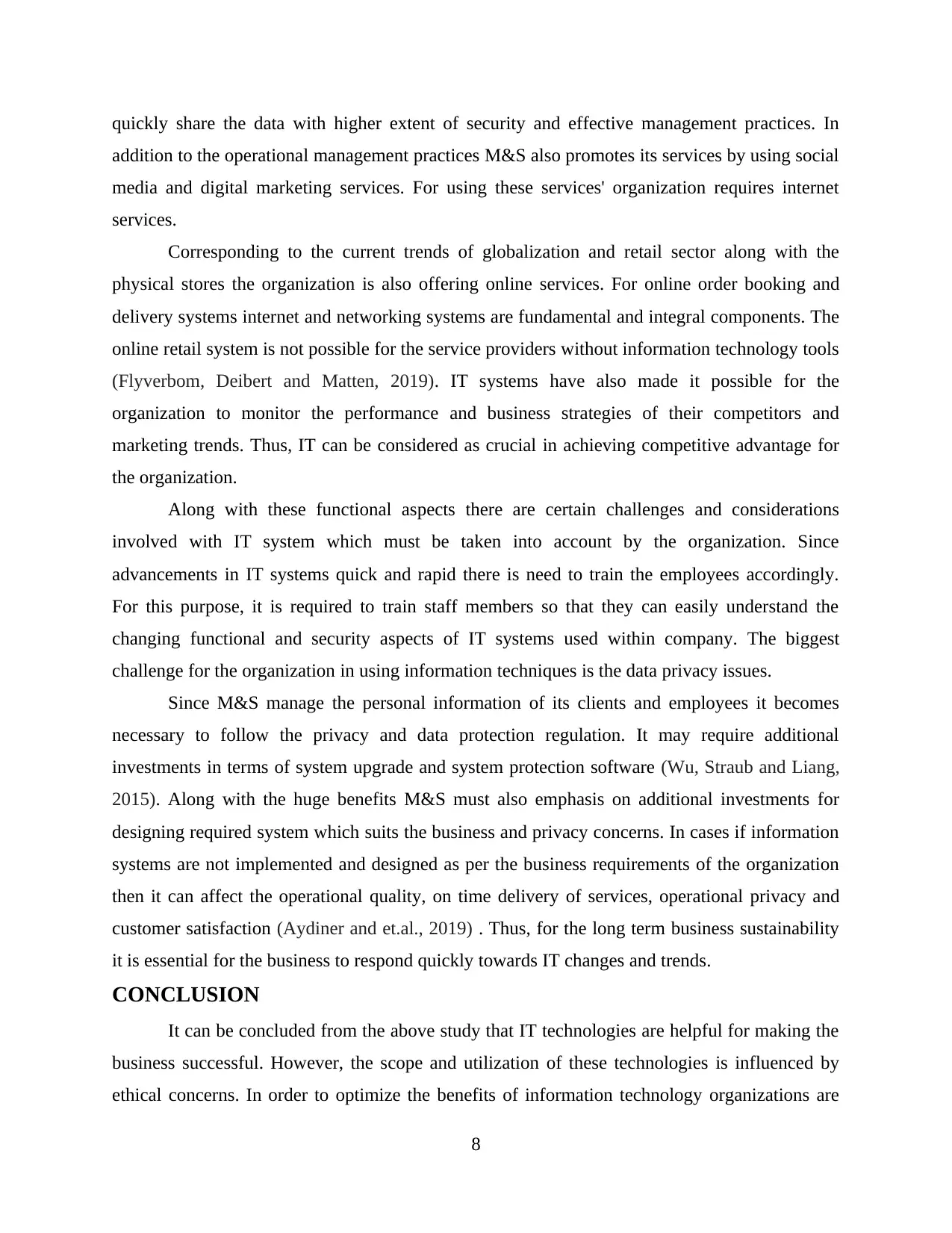
quickly share the data with higher extent of security and effective management practices. In
addition to the operational management practices M&S also promotes its services by using social
media and digital marketing services. For using these services' organization requires internet
services.
Corresponding to the current trends of globalization and retail sector along with the
physical stores the organization is also offering online services. For online order booking and
delivery systems internet and networking systems are fundamental and integral components. The
online retail system is not possible for the service providers without information technology tools
(Flyverbom, Deibert and Matten, 2019). IT systems have also made it possible for the
organization to monitor the performance and business strategies of their competitors and
marketing trends. Thus, IT can be considered as crucial in achieving competitive advantage for
the organization.
Along with these functional aspects there are certain challenges and considerations
involved with IT system which must be taken into account by the organization. Since
advancements in IT systems quick and rapid there is need to train the employees accordingly.
For this purpose, it is required to train staff members so that they can easily understand the
changing functional and security aspects of IT systems used within company. The biggest
challenge for the organization in using information techniques is the data privacy issues.
Since M&S manage the personal information of its clients and employees it becomes
necessary to follow the privacy and data protection regulation. It may require additional
investments in terms of system upgrade and system protection software (Wu, Straub and Liang,
2015). Along with the huge benefits M&S must also emphasis on additional investments for
designing required system which suits the business and privacy concerns. In cases if information
systems are not implemented and designed as per the business requirements of the organization
then it can affect the operational quality, on time delivery of services, operational privacy and
customer satisfaction (Aydiner and et.al., 2019) . Thus, for the long term business sustainability
it is essential for the business to respond quickly towards IT changes and trends.
CONCLUSION
It can be concluded from the above study that IT technologies are helpful for making the
business successful. However, the scope and utilization of these technologies is influenced by
ethical concerns. In order to optimize the benefits of information technology organizations are
8
addition to the operational management practices M&S also promotes its services by using social
media and digital marketing services. For using these services' organization requires internet
services.
Corresponding to the current trends of globalization and retail sector along with the
physical stores the organization is also offering online services. For online order booking and
delivery systems internet and networking systems are fundamental and integral components. The
online retail system is not possible for the service providers without information technology tools
(Flyverbom, Deibert and Matten, 2019). IT systems have also made it possible for the
organization to monitor the performance and business strategies of their competitors and
marketing trends. Thus, IT can be considered as crucial in achieving competitive advantage for
the organization.
Along with these functional aspects there are certain challenges and considerations
involved with IT system which must be taken into account by the organization. Since
advancements in IT systems quick and rapid there is need to train the employees accordingly.
For this purpose, it is required to train staff members so that they can easily understand the
changing functional and security aspects of IT systems used within company. The biggest
challenge for the organization in using information techniques is the data privacy issues.
Since M&S manage the personal information of its clients and employees it becomes
necessary to follow the privacy and data protection regulation. It may require additional
investments in terms of system upgrade and system protection software (Wu, Straub and Liang,
2015). Along with the huge benefits M&S must also emphasis on additional investments for
designing required system which suits the business and privacy concerns. In cases if information
systems are not implemented and designed as per the business requirements of the organization
then it can affect the operational quality, on time delivery of services, operational privacy and
customer satisfaction (Aydiner and et.al., 2019) . Thus, for the long term business sustainability
it is essential for the business to respond quickly towards IT changes and trends.
CONCLUSION
It can be concluded from the above study that IT technologies are helpful for making the
business successful. However, the scope and utilization of these technologies is influenced by
ethical concerns. In order to optimize the benefits of information technology organizations are
8
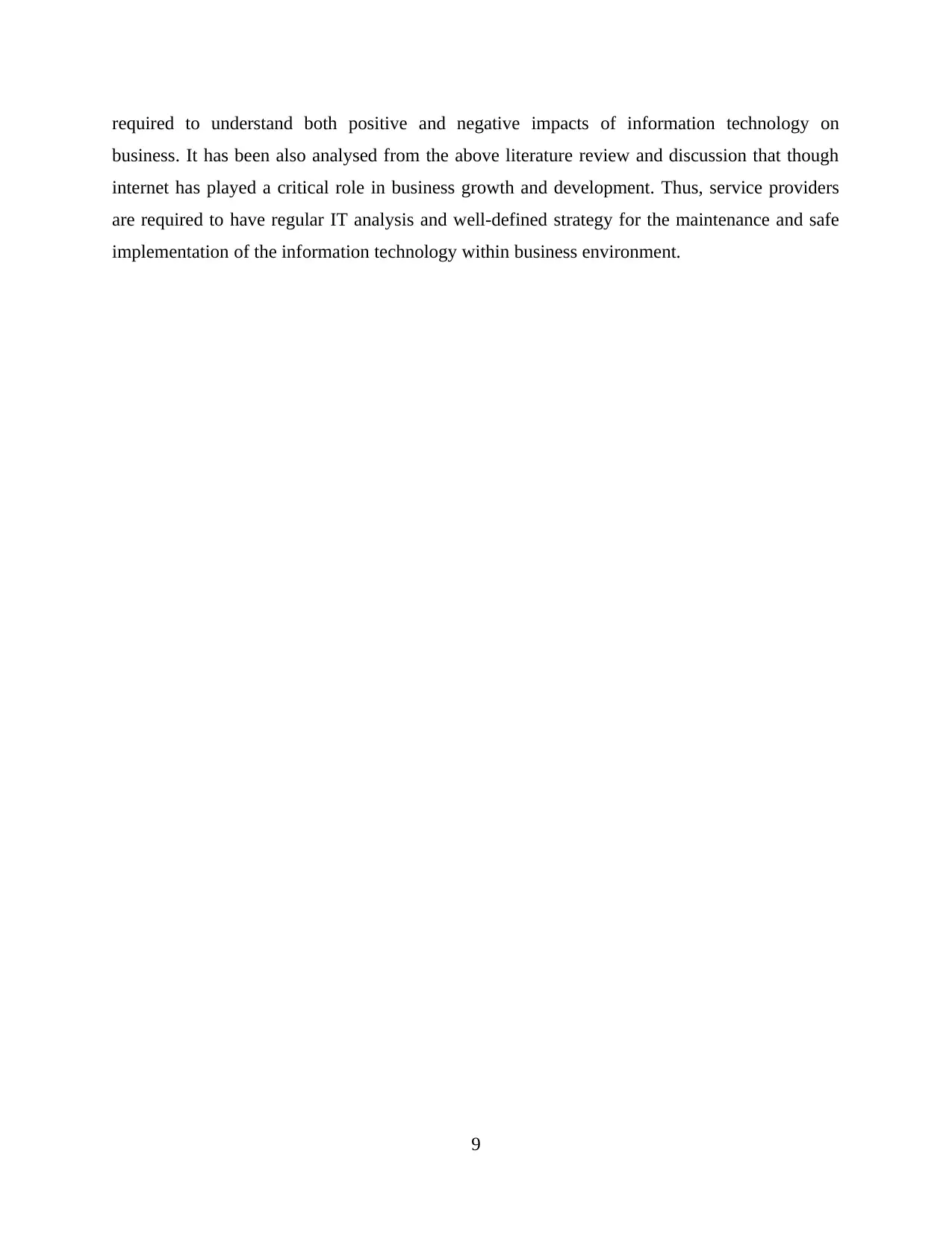
required to understand both positive and negative impacts of information technology on
business. It has been also analysed from the above literature review and discussion that though
internet has played a critical role in business growth and development. Thus, service providers
are required to have regular IT analysis and well-defined strategy for the maintenance and safe
implementation of the information technology within business environment.
9
business. It has been also analysed from the above literature review and discussion that though
internet has played a critical role in business growth and development. Thus, service providers
are required to have regular IT analysis and well-defined strategy for the maintenance and safe
implementation of the information technology within business environment.
9
⊘ This is a preview!⊘
Do you want full access?
Subscribe today to unlock all pages.

Trusted by 1+ million students worldwide
1 out of 18
Related Documents
Your All-in-One AI-Powered Toolkit for Academic Success.
+13062052269
info@desklib.com
Available 24*7 on WhatsApp / Email
![[object Object]](/_next/static/media/star-bottom.7253800d.svg)
Unlock your academic potential
Copyright © 2020–2026 A2Z Services. All Rights Reserved. Developed and managed by ZUCOL.





